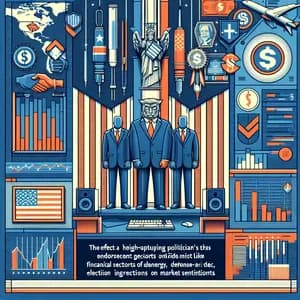Navigating the U.S.-China Tariff War: Stock Market Impacts & Key Players

The Impact of the Escalating U.S.-China Tariff War on Stock Markets
As tensions between the United States and China escalate, the financial markets are feeling the heat, particularly with the ongoing tariff war. Recently, the U.S. dollar has slid to multiyear lows, reflecting investor concerns and market volatility. This situation creates both challenges and opportunities for stock investors as sectors respond differently to these economic pressures.
The Currency Conundrum
The dollar's decline, hitting a three-year low against a basket of major currencies, has broad implications. For companies that rely heavily on international trade or have significant overseas operations, this could mean increased costs or fluctuating revenues as they navigate currency conversion challenges. Stocks of multinational corporations may be particularly sensitive to these changes.
Key Companies to Watch
- Caterpillar Inc. ($CAT) Caterpillar, a leading manufacturer of construction and mining equipment, is particularly vulnerable to trade tensions. As tariffs increase, costs for imported materials can rise, affecting profit margins. Investors should monitor how the company adapts to these challenges and whether it can maintain its competitive edge.
- Apple Inc. ($AAPL) Apple has significant exposure in China, both as a manufacturing hub and a key market for sales. With tariffs potentially raising the prices of its products, investors should keep a close eye on how Apple adjusts its pricing strategy and supply chain logistics in response to this evolving situation.
- Boeing Co. ($BA) Boeing, a major player in the aerospace sector, could face both challenges and opportunities as the tariff war plays out. With the company’s significant export business, fluctuations in tariffs could impact its cost structure. Investors should watch for updates on trade agreements that may affect Boeing's international sales.
- Starbucks Corp. ($SBUX) Starbucks has expanded aggressively in China, making it susceptible to the impacts of tariffs on consumer spending. The company’s ability to maintain its growth trajectory in its second-largest market will be a critical factor for investors to consider amid these trade tensions.
- Ford Motor Co. ($F) Ford and other automakers are also feeling the pinch from tariffs, particularly on imported parts and materials. Investors should keep an eye on Ford’s strategy to offset increased costs and whether it will pass these costs onto consumers or absorb them to stay competitive.
Conclusion
The escalating U.S.-China tariff war presents a mixed bag for stock investors. While some companies may struggle with increased costs and fluctuating revenues, others may find ways to adapt and thrive in a challenging environment. It's essential for investors to stay informed about how these dynamics play out in the markets and to consider the long-term implications for their portfolios.
For more detailed insights, check out the following articles:




